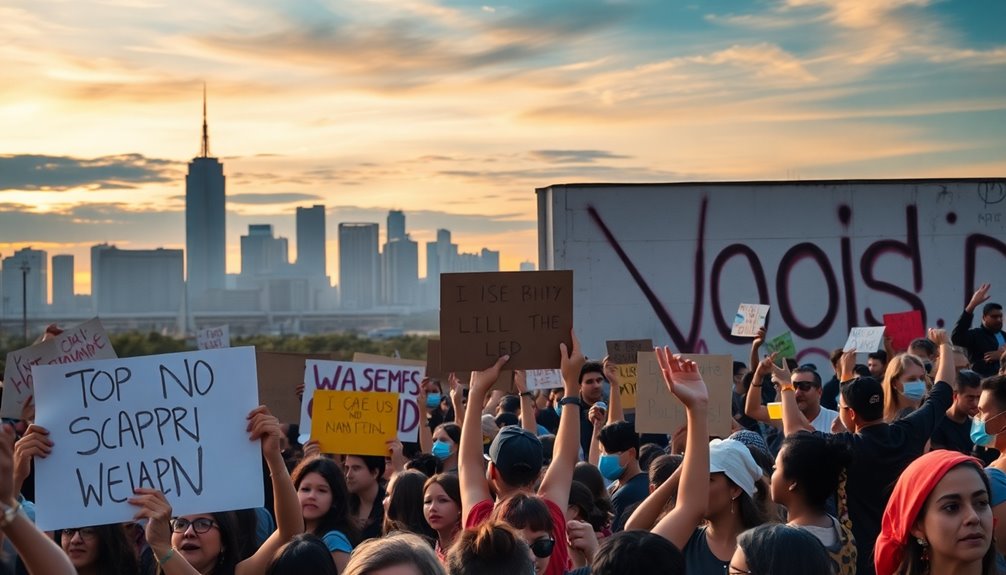ACAB stands for "All Cops Are Bastards," a phrase that sparks intense debate about police and authority. You might trace its origins back to 1920s England, where striking workers first coined it. Over the decades, it's transformed into a rallying cry in protests against police brutality, especially after incidents like George Floyd's murder. While supporters see it as a critique of systemic oppression, critics argue it unfairly condemns all officers. This controversial acronym reflects deeper societal issues and movements pushing for reform. Stick around, and you might uncover more about its impact and the discussions it fuels.
Key Takeaways
- ACAB stands for "All Cops Are Bastards," reflecting anti-police sentiments and systemic critiques of law enforcement.
- The acronym originated in 1920s England and gained popularity in various subcultures, especially during the 1970s.
- It serves as a rallying cry in protests against police brutality, particularly within the Black Lives Matter movement.
- ACAB critiques institutional corruption and violence, advocating for radical reform and accountability in policing practices.
- The acronym has sparked debate, with supporters viewing it as a tool for social justice, while critics see it as an unfair generalization.
Meaning and Origins of ACAB
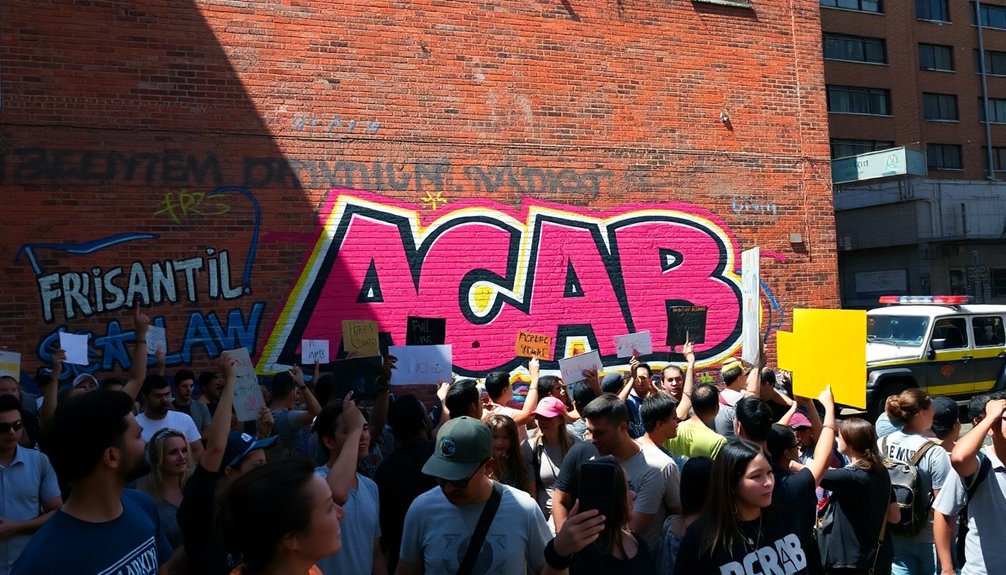
Originating in 1920s England, the phrase gained traction among workers on strike, who later abbreviated it to ACAB in the 1940s. By the 1970s, it appeared in the media and prison culture, gaining visibility through graffiti and tattoos. Its cultural significance grew in the 1980s, as punk and skinhead subcultures adopted it, along with various musical movements. While ACAB resonates with anti-authoritarian sentiments, it's crucial to understand its context due to its usage by both right-wing groups and leftist movements. This duality underscores the complexity surrounding the acronym's meaning and implications, as it was notably popularized by the first wave Oi! band in the punk scene.
Historical Development of the Acronym
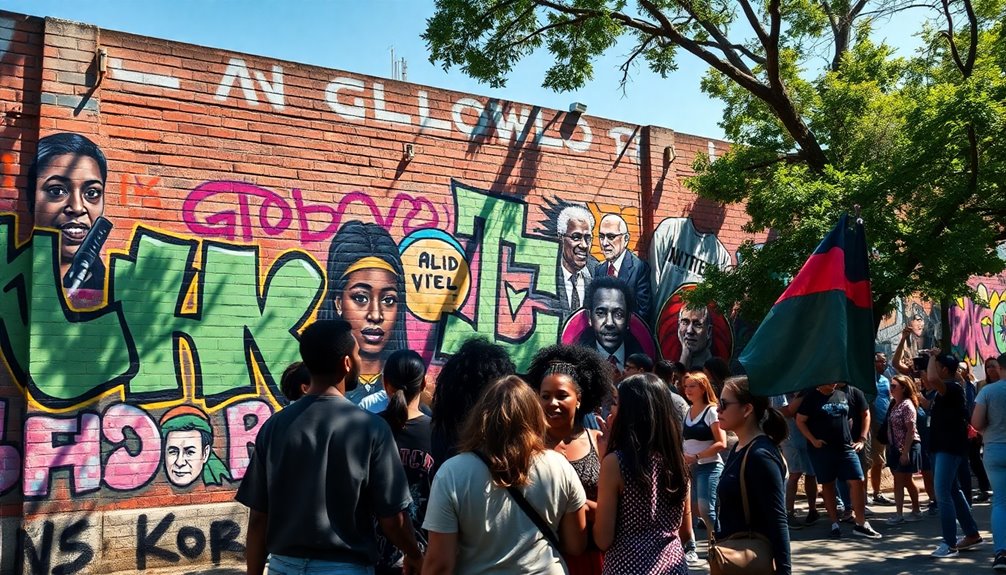
The historical development of the acronym ACAB reflects a rich tapestry of social movements and cultural shifts. It first emerged in England during the 1920s as "All coppers are bastards," capturing anti-police sentiments. By the 1940s, striking workers allegedly abbreviated it to "ACAB," although this remains a debated origin. Its popularity surged in British prisons during the 1970s, where it became a common tattoo and graffiti message. The Hells Angels also used it, and it appeared in the *Daily Mirror* in 1970.
As the 1980s rolled in, punk and skinhead subcultures embraced ACAB, notably through the 1982 song “A. C. A. B. ” by the British Oi punk band, the 4-Skins. Similarly, the German punk band Slime contributed to its influence on youth movements. ACAB’s reach extended internationally, especially through football culture, with fans adopting it despite legal restrictions. The acronym gained renewed visibility in protests following George Floyd’s murder in 2020, appearing widely in media and on social platforms. Its history demonstrates a persistent reaction to perceived police misconduct and systemic injustices. The resurgence of the ACAB slogan in recent protests has sparked discussions not only about police violence but also about the broader societal issues of racism and inequality. In contemporary culture, the phrase has transcended its original punk roots, becoming a rallying cry for various movements advocating for justice and reform. This cultural evolution has invited a wide range of artistic interpretations and critiques, as seen in different media, including music, where one might explore a pop smoke album cover analysis to understand the interplay between urban art and social commentary.
Cultural Significance and Usage
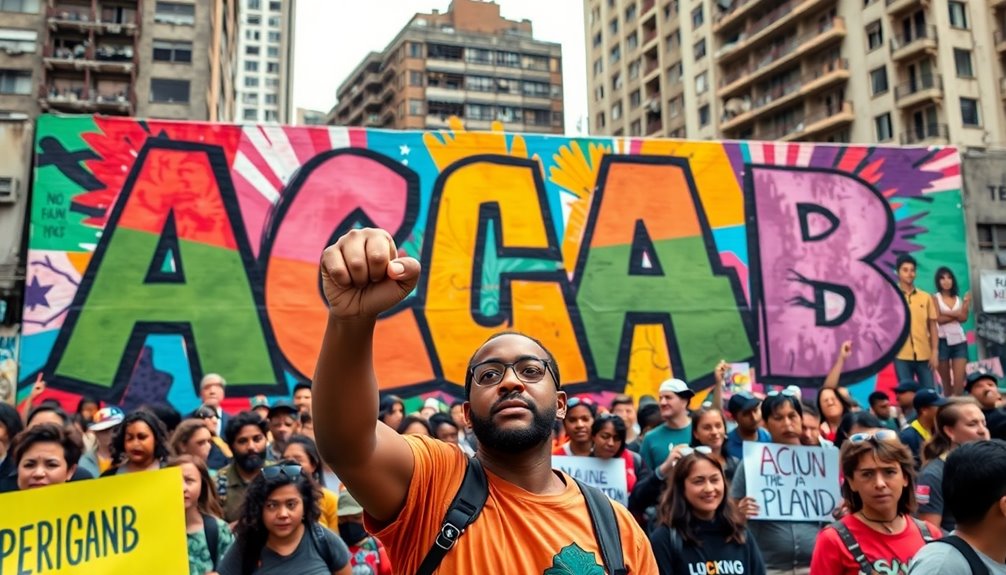
ACAB's cultural significance extends far beyond its origins in the UK punk scene, as it resonates with various social and political movements around the globe. You might first encounter the acronym through music, especially within the Oi sub-genre, where bands like The 4-Skins and Slime popularized it in the 1980s. Its influence spread to other genres, including rap and techno, reflecting a broad cultural adoption.
You'll also notice ACAB within diverse subcultures, embraced by both right-wing and anarchist factions. Groups like SHARP and trad-skins, alongside some fascist elements, have claimed it, showcasing its complex appeal. In European football culture, it's a common chant among hooligans and ultras, tying back to English football.
Beyond music and subcultures, ACAB gained global recognition during protests against police brutality, prominently featured in Black Lives Matter demonstrations. It appears on banners, T-shirts, and graffiti, symbolizing widespread anti-police sentiment. This usage, however, often leads to legal repercussions, revealing deeper societal tensions regarding law enforcement and individual rights. As you explore its cultural significance, you'll uncover a multifaceted symbol of resistance and identity. The militarization of police shows little to no impact on crime rates, further fueling this sentiment within the protests.
Social and Political Critique
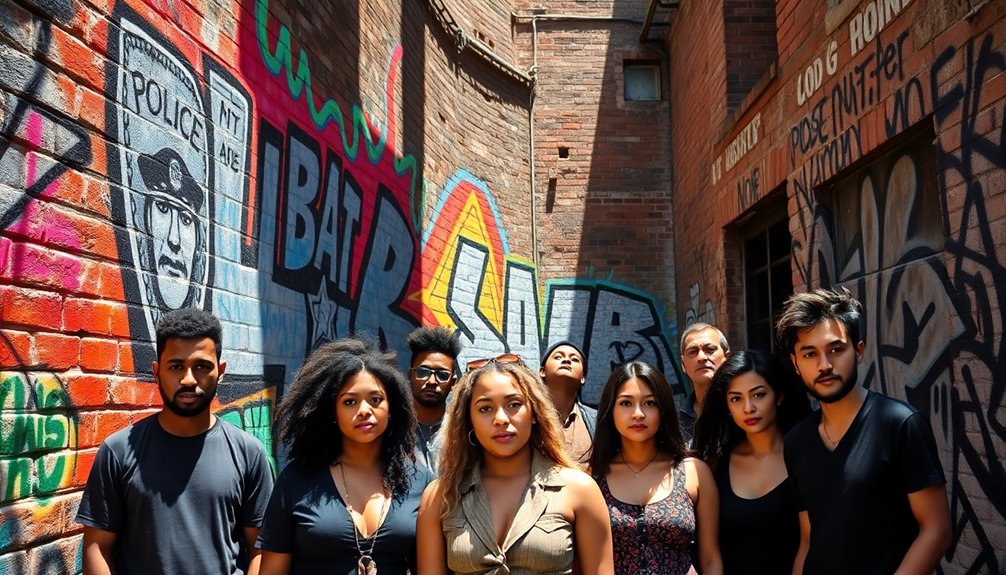
Since its inception, ACAB has served as a powerful critique of police institutions, shedding light on the systemic issues that have plagued law enforcement for decades. You'll notice that this acronym originated in England during the 1920s and gained traction among striking workers in the 1940s. It highlights the pervasive targeting of minorities, particularly people of color, and critiques a culture of violence rooted in a patriarchal hierarchy within police forces.
The "Blue Wall of Silence" reflects how officers often remain quiet about misconduct, creating an environment where brutality can thrive without accountability. Critics argue that this leads to institutional corruption, where power is misused to justify violent actions. In fact, studies indicate that Black individuals are disproportionately affected by police violence, underscoring the urgent need for reform.
ACAB advocates for radical reform, including defunding the police and reallocating funds to essential social programs. You might find it striking that the typical police training lasts only six months, leaving officers ill-equipped for complex situations. The call for systemic change emphasizes that reforming the current system is insufficient; a complete overhaul is necessary. By engaging communities in this discourse, you can help amplify the voices of those historically silenced by policing practices.
Legal Issues and Controversies
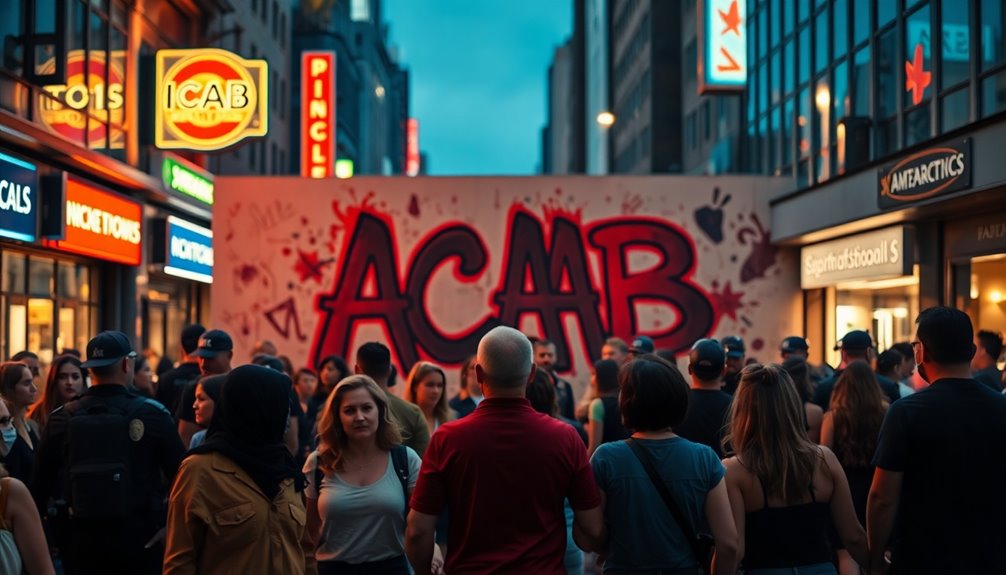
Often, legal issues surrounding the acronym ACAB arise in various jurisdictions, highlighting the complexity of freedom of expression laws. In Germany, the Federal Constitutional Court ruled that using ACAB isn't a criminal insult if it targets the police as a collective rather than individual officers. Article 5 of the German Constitution protects this expression, emphasizing that only personalized insults can lead to punishment.
In Austria, while ACAB might seem to violate public decency, the Constitutional Court also supports its use as a general critique of the police. However, in other countries like Spain and Croatia, individuals faced fines for displaying the acronym. In the Netherlands, fans were penalized for wearing T-shirts featuring the numbers that correspond to ACAB. The ACAB narrative can alienate potential allies in reform efforts, including well-intentioned law enforcement, thus affecting public perception of police as a whole.
These legal interpretations vary widely. In some cases, arresting individuals for using ACAB during protests raises questions about public order laws, as seen in Phoenix, Arizona, where flawed prosecutions occurred. Thus, context matters significantly; whether the expression is deemed acceptable often hinges on whether it refers to the police collectively or targets specific individuals. Understanding these nuances is crucial for navigating the legal landscape surrounding ACAB.
Global Impact and Protests
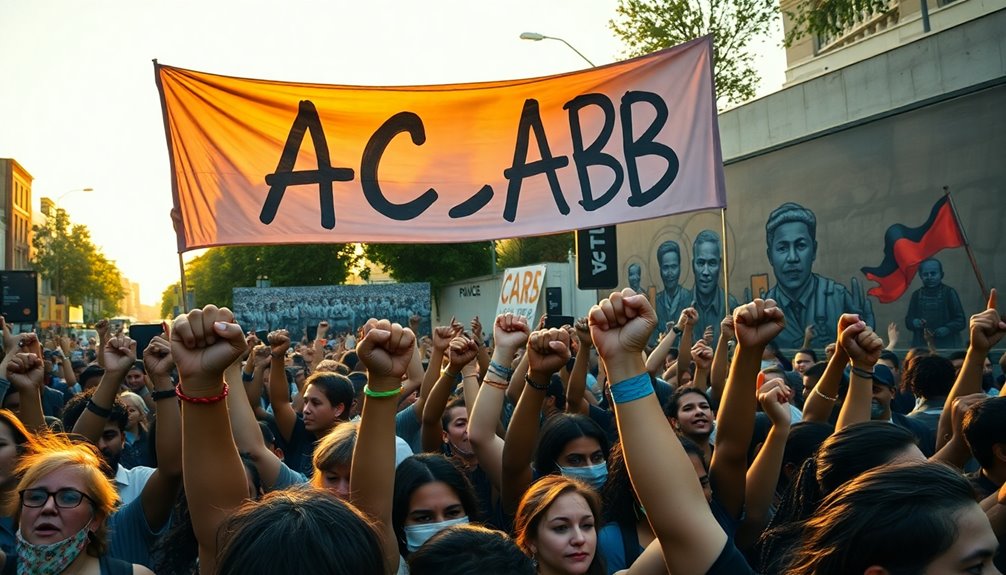
The acronym ACAB has transcended its origins, evolving into a powerful symbol of resistance against police brutality and systemic injustice worldwide. Initially rooted in the UK working-class movement, it gained traction through punk and skinhead cultures, becoming a rallying cry that resonates in various protests across the globe. Following the tragic deaths of George Floyd, Ahmaud Arbery, and Breonna Taylor, you've likely seen ACAB emblazoned on signs and shouted in the streets, highlighting systemic issues, particularly against people of color. Black individuals are killed by police at over twice the rate of white individuals, which underscores the urgency of addressing these systemic injustices.
Its influence stretches beyond the US, appearing in protests in countries like Colombia and during pro-democracy movements in Hong Kong, showcasing a shared discontent with oppressive policing practices. In every corner, from graffiti on walls to merchandise, ACAB serves as a stark reminder of the ongoing struggle against authority.
While critics argue that the slogan dismisses good officers, supporters assert it critiques the system itself, pointing to broader societal issues like racial disparities and excessive force. As ACAB continues to gain visibility in media and social platforms, it represents not just a phrase, but a collective demand for justice and accountability.
Frequently Asked Questions
Is ACAB Used in Any Specific Songs or Music Genres?
You'll find ACAB prominently featured in various music genres, especially punk rock and skinhead music. Bands like The 4-Skins and Slime have iconic tracks that incorporate the acronym. It even appears in modern rap and techno, showing its reach across different styles. Songs like "A.C.A.B." by The 4-Skins and Ja, Panik's humorous take highlight its cultural significance, making it a rallying cry within subcultures and social movements.
Are There Any Notable Artworks Featuring the ACAB Acronym?
You'll find that ACAB has inspired various notable artworks and graffiti across cities like Hamburg, Berlin, and Cork. Each piece reflects a strong anti-police sentiment, often appearing during protests against police brutality. In Lisbon and Madrid, you can spot it prominently, highlighting its cultural significance. Additionally, street art featuring ACAB has become a powerful expression within social movements, making it an enduring symbol of resistance and critique against systemic issues.
How Do Different Countries View the ACAB Sentiment?
You'll find that different countries view the ACAB sentiment through varied lenses. In the UK, it's rooted in punk culture, while in Austria, it can lead to legal repercussions. In the U.S., it gained traction during protests, prompting discussions about police reform. Meanwhile, Indonesia's rising anti-police sentiment reflects public outrage over brutality. This global spread showcases how ACAB resonates differently, influenced by local history and current events.
What Are Some Common Misconceptions About ACAB?
You might think ACAB targets individual police officers, but it actually critiques the system itself. It's not a personal attack; instead, it highlights systemic issues. Many believe ACAB is a new phenomenon, but it dates back to the 1920s. Some associate it only with racist groups, while it spans various anti-authoritarian movements. Lastly, it's often misunderstood as a call for violence, when it's really about advocating for reform and justice.
Can ACAB Be Seen in Fashion Trends or Brands?
You'll notice ACAB prominently featured in fashion trends, especially on T-shirts and streetwear. Many brands embrace it as a statement piece, tapping into anti-establishment sentiments. While it reflects a desire for social change, wearing ACAB can lead to legal issues, like fines or arrests, depending on the context. You might also see it cleverly disguised as "1312" to sidestep immediate recognition, showcasing its ongoing influence in contemporary fashion.
Conclusion
In understanding ACAB, you uncover its deep roots in societal discontent and the call for change. This acronym isn't just a phrase; it represents a movement that challenges authority and advocates for justice. By recognizing its historical and cultural significance, you can engage in meaningful discussions about law enforcement and community relations. Whether you agree or disagree, ACAB undeniably sparks conversation and reflection on the values and structures shaping our society today.
